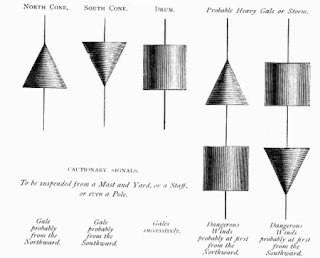 With this man: Robert Fitzroy, Admiral Royal Navy, 1805-1865. He was likely best known as captain of HMS Beagle, the ship that carried Charles Darwin to Patagonia and onward where he (Darwin) developed his Theory of Evolution. While he more or less liked Darwin - they were shipmates for 5 years (1831-36) during the famous voyage - he often said his biggest regret was having provided Darwin with the opportunity to fly in the face of the religion that Fitzroy held sacred. While he remained friends with this famous passenger for many years, he never "signed on" to Darwin's theory which ultimately was published as "Origin of the Species" in 1859. Finally, after a particularly heated debate in public, and continued criticism of Darwin's work, he severed the connection, suffered severe depression (brought about by this failure and more, as we shall see in a moment), and ultimately, committed suicide in his home with a straight razor (How about that!). But before he did that, and following his retirement from the Royal Navy (he had been appointed Governor General of New Zealand (1843) but that didn't work out so well as he had difficulty dealing with the indigenous Maori. He was recalled in 1845 and hung out in England until he retired in 1850), he created his most lasting legacy. It was then that he devoted himself to the study of meteorology. He also coined the word "forecasts."
With this man: Robert Fitzroy, Admiral Royal Navy, 1805-1865. He was likely best known as captain of HMS Beagle, the ship that carried Charles Darwin to Patagonia and onward where he (Darwin) developed his Theory of Evolution. While he more or less liked Darwin - they were shipmates for 5 years (1831-36) during the famous voyage - he often said his biggest regret was having provided Darwin with the opportunity to fly in the face of the religion that Fitzroy held sacred. While he remained friends with this famous passenger for many years, he never "signed on" to Darwin's theory which ultimately was published as "Origin of the Species" in 1859. Finally, after a particularly heated debate in public, and continued criticism of Darwin's work, he severed the connection, suffered severe depression (brought about by this failure and more, as we shall see in a moment), and ultimately, committed suicide in his home with a straight razor (How about that!). But before he did that, and following his retirement from the Royal Navy (he had been appointed Governor General of New Zealand (1843) but that didn't work out so well as he had difficulty dealing with the indigenous Maori. He was recalled in 1845 and hung out in England until he retired in 1850), he created his most lasting legacy. It was then that he devoted himself to the study of meteorology. He also coined the word "forecasts."He was troubled, as a naval officer, by the massive loss of life at sea, often from storms, along the coast of Victorian Britain. As a matter of interest, there were over 7,400 ships wrecked off England resulting in a loss of more than 7,200 lives. Fitzroy believed that with sufficient warning, these wrecks might have been avoided. When the Royal Charter gold ship sank off Anglesey in 1859, the Admiralty gave him permission and resources to begin to issue storm warnings. And he sent out his warnings via the new-fangled electric telegraph!
As that technology expanded, Fitzroy used it to have far flung stations send him information on what their weather was, real time. His focus was obviously on Britain's coast but as time went on, he got information from across the Channel and added that to his forecasts. With the use of the telegraph, he was able to warn distant stations and harbors in England that a storm was approaching, and set up a signal system of hoisted shapes to warn the ships.
His predictions found their way to the Times of London which published them at first as entertainment, but once people began to "catch on" they became more serious. Then, however, like now, if he was wrong, he caught hell from his followers. Even some of those who benefited the most, Naval interests, were quick to castigate him when he erred. He threw himself deeper into the work, taking his failures personally. The Scientific community was skeptical and he worked tirelessly to convince them. The politicians whined about the cost of the telegraph he used, and fishermen who believed a forecast and stay in port, complained bitterly about lost wages if the weather remained calm when Fitzroy's forecast called for storms. His depression returned with a vengeance in the face of all this adversity and he was exhausted. He committed suicide on 30 April 1865, 150 years ago last week.
 But before he gave up both this dream and his life, he invented the barometer
But before he gave up both this dream and his life, he invented the barometer which he called a "storm glass" and
weather charts available to navigators.
Until next, I hope your skies are clear and the weather warm. And a most happy Mother's Day to those of you to which it applies!
Fair Winds,
Old Salt




No comments:
Post a Comment